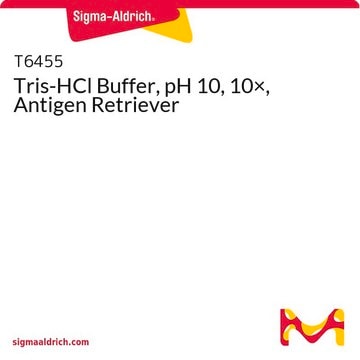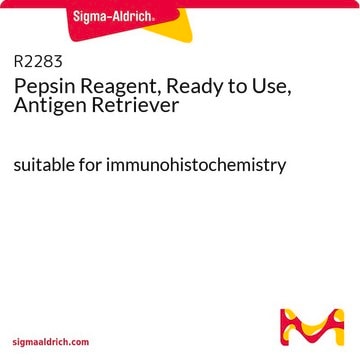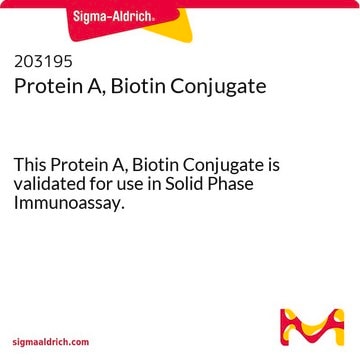E1161
EDTA Buffer, pH 8.5, 10×, Antigen Retriever
Iniciar sesiónpara Ver la Fijación de precios por contrato y de la organización
About This Item
UNSPSC Code:
12352107
NACRES:
NA.47
Productos recomendados
Application
Used as a heat-induced antigen retriever on formalin-fixed paraffin-embedded (FFPE) tissue sections prior to application of antibodies. In immunohistochemistry (IHC), most commonly used fixatives such as formalin mask tissue antigens (cellular, membrane, and nuclear) by their intrinsic crosslinking. This masking results in poor or no staining in IHC. The use of EDTA buffer, pH 8.5, or other antigen retrieval solutions on FFPE tissue sections improves accessibility of antibodies to tissue antigens. EDTA buffer has been used to heat tissue sections in order to visualize antigens by immunohistochemical analysis.
signalword
Warning
hcodes
Hazard Classifications
Aquatic Chronic 3 - Skin Sens. 1
Storage Class
12 - Non Combustible Liquids
wgk_germany
WGK 3
flash_point_f
Not applicable
flash_point_c
Not applicable
Certificados de análisis (COA)
Busque Certificados de análisis (COA) introduciendo el número de lote del producto. Los números de lote se encuentran en la etiqueta del producto después de las palabras «Lot» o «Batch»
¿Ya tiene este producto?
Encuentre la documentación para los productos que ha comprado recientemente en la Biblioteca de documentos.
Los clientes también vieron
Expressions of matrix metalloproteinases 2, 7, and 9 in carcinogenesis of pancreatic ductal adenocarcinoma.
Jakubowska K, et al.
Disease Markers, 2016 (2016)
Thomas J Gniadek et al.
Modern pathology : an official journal of the United States and Canadian Academy of Pathology, Inc, 30(4), 530-538 (2017-01-07)
Predicting response to checkpoint blockade therapy for lung cancer has largely focused on measuring programmed death-ligand 1 (PD-L1) expression on tumor cells. PD-L1 expression is geographically heterogeneous within many tumors, however, and we questioned whether small tissue samples, such as
Hong-Wei Sun et al.
Cancer immunology research, 9(1), 20-33 (2020-11-13)
Metabolism is reprogrammed in cancer to fulfill the demands of malignant cells for cancer initiation and progression. Apart from its effects within cancer cells, little is known about whether and how reprogramed metabolism regulates the surrounding tumor microenvironment (TME). Myeloid-derived
Nuestro equipo de científicos tiene experiencia en todas las áreas de investigación: Ciencias de la vida, Ciencia de los materiales, Síntesis química, Cromatografía, Analítica y muchas otras.
Póngase en contacto con el Servicio técnico












